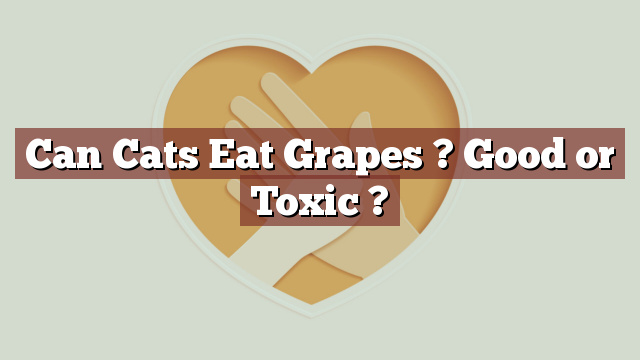Can Cats Eat Grapes? Good or Toxic?
Knowing which foods are safe for our beloved feline friends is crucial for their overall well-being. While certain foods can provide essential nutrients to cats, others can be harmful or even toxic to them. One such food that raises questions among cat owners is grapes. In this article, we will explore the nutritional value of grapes for cats, whether they are toxic, the potential risks and benefits, what to do if your cat eats grapes, and finally conclude with a recommendation.
Nutritional Value of Grapes for Cats
Grapes are known for their delicious taste and vibrant colors. However, when it comes to cats, their nutritional value may not be as significant. Grapes contain various vitamins, including vitamin C and vitamin K, as well as minerals like potassium and manganese. These nutrients are vital for humans, but cats have different dietary requirements. Cats are obligate carnivores, meaning their bodies require primarily animal-based proteins to thrive. While grapes have some nutritional value, they are not essential for a cat’s diet.
Are Grapes Toxic for Cats?
The answer to the question "can cats eat grapes?" is a resounding no. Grapes, along with raisins, can be toxic to cats. The exact substance within grapes that causes toxicity is still unknown, but even a small amount can lead to severe health problems. Some common symptoms of grape toxicity in cats include vomiting, diarrhea, abdominal pain, increased thirst, and decreased urine production. In severe cases, ingestion of grapes may even result in kidney failure, which can be life-threatening.
Potential Risks and Benefits of Cats Eating Grapes
The potential risks of cats eating grapes far outweigh any possible benefits. While grapes are a natural and healthy snack option for humans, they can pose significant dangers to our feline companions. The toxicity of grapes to cats is well-documented through scientific studies and veterinary reports. It is best to avoid feeding grapes to cats altogether, as there are plenty of other safer and more suitable treats available.
What to Do If Your Cat Eats Grapes
If you suspect that your cat has ingested grapes, it is essential to take immediate action. Time is of the essence in such situations, and contacting your veterinarian should be your first step. They can provide guidance based on your cat’s specific condition and advise you on the best course of action. Your vet may recommend inducing vomiting or performing other necessary procedures to minimize the potential harm caused by grape ingestion. Remember, the earlier the intervention, the better the chances of a positive outcome for your furry friend.
Conclusion: Grapes are Toxic for Cats and Should Be Avoided
In conclusion, it is crucial to be aware of what foods are safe for our feline companions. When it comes to grapes, the answer to the question "can cats eat grapes?" is a firm no. Grapes are toxic to cats and can lead to serious health complications, including kidney failure. It is best to steer clear of grapes and raisins when it comes to treating our cats. Instead, focus on providing them with a well-balanced diet that meets their nutritional needs. If you suspect your cat has consumed grapes, consult your veterinarian promptly for appropriate guidance and care.
Thank you for investing your time in exploring [page_title] on Can-Eat.org. Our goal is to provide readers like you with thorough and reliable information about various dietary topics. Each article, including [page_title], stems from diligent research and a passion for understanding the nuances of our food choices. We believe that knowledge is a vital step towards making informed and healthy decisions. However, while "[page_title]" sheds light on its specific topic, it's crucial to remember that everyone's body reacts differently to foods and dietary changes. What might be beneficial for one person could have different effects on another. Before you consider integrating suggestions or insights from "[page_title]" into your diet, it's always wise to consult with a nutritionist or healthcare professional. Their specialized knowledge ensures that you're making choices best suited to your individual health needs. As you navigate [page_title], be mindful of potential allergies, intolerances, or unique dietary requirements you may have. No singular article can capture the vast diversity of human health, and individualized guidance is invaluable. The content provided in [page_title] serves as a general guide. It is not, by any means, a substitute for personalized medical or nutritional advice. Your health should always be the top priority, and professional guidance is the best path forward. In your journey towards a balanced and nutritious lifestyle, we hope that [page_title] serves as a helpful stepping stone. Remember, informed decisions lead to healthier outcomes. Thank you for trusting Can-Eat.org. Continue exploring, learning, and prioritizing your health. Cheers to a well-informed and healthier future!

